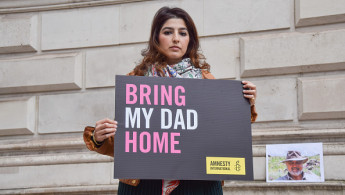US-Briton temporarily released from Tehran jail: UK
Morad Tahbaz, an environmental campaigner with UK and US citizenship held in Iran on espionage charges, has been temporarily released from jail and is currently at his family home in Tehran, Britain said on Wednesday.
"The Tahbaz family have confirmed Morad has been released from Evin prison on furlough and is at their home in Tehran," the UK Foreign Office said in a statement.
Tahbaz, who has Iranian citizenship as well, remained in prison in Tehran while British-Iranian dual nationals Nazanin Zaghari-Ratcliffe and Anoosheh Ashoori flew home in March after the UK government repaid a historic debt to Tehran.
His daughter Roxanne has criticised Britain's government for leading them "to believe all this time that he was to be a part of any deal they were making for the other hostages".
"Yet he's still there. He's been abandoned by his government," she told AFP.
The UK government maintains that it cannot secure his release because he is also a US citizen, and that the Iranians are also having discussions with Washington officials.
"Morad is a tri-national and we continue to work closely with the United States to urge the Iranian authorities to permanently release him and allow his departure from Iran," the Foreign Office said Wednesday.
A Tehran court in 2020 jailed Tahbaz for 10 years on charges of spying, conspiring with Washington and damaging national security.
He and seven others convicted on similar charges worked with environmental group Persian Wildlife Heritage Foundation to track endangered species and were arrested on suspicion of espionage in early 2018.
Britain's foreign ministry told Tahbaz's family that when the other hostages were released, Iran had agreed to free Tahbaz on unrestricted curfew.
But he was returned to Tehran's Evin prison within 24 hours of his partial release, prompting him to go on hunger strike.
Zaghari-Ratcliffe was released on furlough in March 2020, but was taken back to Evin prison after two weeks, before being fully released two years later.




 Follow the Middle East's top stories in English at The New Arab on Google News
Follow the Middle East's top stories in English at The New Arab on Google News


![A group of Palestinians, foreign and Israeli activists gather to participated in an olive picking event on the land in the town of Battir, which is under threat of confiscation by Israel in Bethlehem, occupied West Bank on 8 November 2024. [Getty]](/sites/default/files/styles/image_330x185/public/2182930803.jpeg?h=199d8c1f&itok=__0LgGsa)